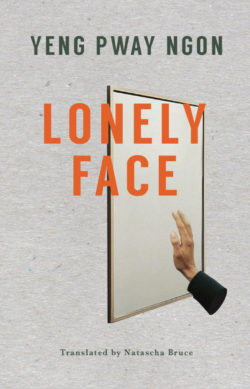Lonely Face by Yeng Pway Ngon
translated by Natascha Bruce
Balestier Press, 2019
Publisher's Blurb
Singapore, late 1980s. As women gain power and independence, what’s an insecure guy to do? Lonely Face is the story of a man on the cusp of middle age, left behind by changing times. Fleeing his crumbling marriage on an overnight bus to Genting Highlands, he tries his luck at slot machines rather than the vagaries of modern romance. This snapshot of a society in flux is a newly-translated early work by acclaimed novelist Yeng Pway Ngon, Cultural Medallion recipient and three-time winner of the Singapore Literature Prize.
Reading Chinese Network Reviews
Reviewed by Barry Howard, 5/6/19
 In a changing society, a man in his late thirties has to deal with a failed marriage, an unfulfilled work life, everyday parental worries and guilt over how he treated his dying father. In Hollywood he would find his soulmate, set up the next entrepreneurial success story, be a cool dad and forgive himself. In real life, for every victor held aloft many are waylaid by mistakes and circumstance.
In a changing society, a man in his late thirties has to deal with a failed marriage, an unfulfilled work life, everyday parental worries and guilt over how he treated his dying father. In Hollywood he would find his soulmate, set up the next entrepreneurial success story, be a cool dad and forgive himself. In real life, for every victor held aloft many are waylaid by mistakes and circumstance.
Written and set in the late 1980s, a 38-year-old Chinese educated Singaporean goes away for the weekend. He’s at that age when we begin to reflect on our lives, especially when things haven’t gone so well. On his trip, flashbacks give you, me and him a start on the long road to self-realisation.
I say you, me and him because chapters switch between the first, second and third person. The continual switch of perspective challenges the reader to understand and be compassionate. The protagonist has messed up and has yet to fully realise that, yes, it’s a result of his own choices but also due to many factors beyond his control.
His Chinese heritage works against him. Like his ancestors, he feels the need to uphold the values of filial piety; but his wife is not so traditional. So, they fall out over how to care for an ailing parent.
A Chinese language education and a Chinese literature degree leave him ill-prepared for work in an economy focussed on international trade. His colleagues might be ethnically Chinese, but they are all English language educated and there is the sense that they feel socially superior as a result. He tries desperately to fit in by working hard on his English; banning himself from reading Chinese newspapers as if they were banners of shame marking him out as intellectually backward.
A failure to prosper career-wise defines him. He has fallen short of the expectations demanded of a man in a patriarchal society defined by consumerism. “Qimin [wife] thought I should earn more money, buy a car, move us out of our five-room HDB [state-built] flat, pay for Xiaoqiang [son] to take violin lessons… And I didn’t do any of those things, because I couldn’t.”
The marriage falls apart and divorce leaves the protagonist unable to deal with the ensuing loneliness. He is no longer a functioning family member; he is alone. The routine and busyness of a parent vanishes. Single, he has time on his hands but no idea what to do with it.
As typical of his time, gender and culture, he is emotionally stunted. He carries bottled up feelings from his childhood over his own broken family. When he wants to cry, he can’t. The first and last time he held his father was when he found him dead. His repressed nature, perhaps exacerbated by a reserved and conservative society, means he is inept in social situations.
In the end this is a story of a man left behind by, and unable to adapt to, changing times. He is not blameless, because we all have to take responsibility for our choices. However, we should also recognise the hand he’s been dealt with by situation and upbringing. And after our brief look at his life, we leave him having to face up to his difficulties alone.
Reviewed by Barry Howard
Reviewed by Michelle Deeter, 20/3/19
 Lonely Face is written by Yeng Pway Ngon, a prolific writer from Singapore. The story follows a spineless man as he takes a trip to a casino in Genting, flashing back to memories of his childhood, his youth and the fights he had with his wife before she left him. Readers expecting to hear her side of the story will be disappointed—she is only described in the protagonist’s memories. A full picture of her is elusive.
Lonely Face is written by Yeng Pway Ngon, a prolific writer from Singapore. The story follows a spineless man as he takes a trip to a casino in Genting, flashing back to memories of his childhood, his youth and the fights he had with his wife before she left him. Readers expecting to hear her side of the story will be disappointed—she is only described in the protagonist’s memories. A full picture of her is elusive.
The protagonist has a poorly paid job, is estranged from his mother and sister, and struggles to take care of his ailing father. His marriage is on the rocks and when the novel opens, his wife has left him. Is the protagonist at fault for all the things that go wrong in his life? Probably. The protagonist does not have a name and some details of his life are not available to the reader, but through his internal monologue it is clear he is misogynistic. He assumes that a flirtatious woman in a casino is unmarried because unmarried women would not chat to strangers of the opposite sex. Despite never having been to Europe, he worries that when western men get aroused, they are unable to control themselves. He can’t help himself from assuming that his wife’s boss is taking advantage of her. When realizes that he is thinking compulsively, he makes no effort to control himself.
Sadly, the protagonist does not mature by the end of the book. His single realization is that he is becoming more and more like his father. Even this realization is flawed, because his father had an affair, while the protagonist’s is only faltering because he lets doubts get the better of him. Furthermore, his father did not express his love to his children, while the protagonist reads to his son so he can fall asleep. In reality, the protagonist’s life did not have to be so dissatisfying if he could just learn how to build trust with his wife and try to get psychological help. By the end of the book, he seems to decide that he is not going to try to win his wife. This was painful for me to read—the protagonist makes no real effort to solve his problems.
Adjectives that fit our protagonist include socially inept, addicted (to gambling), self-righteous, and petty. He is a bit of a loser, and his lack of initiative is mirrored in the way the story tends to wander aimlessly. But this is intentional. Rather than creating a likeable guy who is skilled at communicating with others, Yeng Pway Ngon wanted to create a story about an everyman. This aim is fulfilled in some ways, such as reminded readers that everyone has regrets or pivotal moments in their life that they tend to relive dozens of times. In other ways, it falls a bit short.
Some readers might find that the protagonist is not a relatable character. He is so paralyzed by indecision that nothing happens in the book. The character is somewhat of a lost cause. He thinks he is entitled to a decent job, a loving wife, and healthy relationships when he does not realize he might need to make more effort to maintain relationships or learn from his mistakes. Still, that does not make the novel a waste of time. I think the novel is a great deal more nuanced than the “When is International Men’s Day” tweets that are posted every March 8th. The book and the tweets are hinting at the same question. Now that society is changing drastically, where do men belong?
The translation of the novel, by Natascha Bruce, is flawless. Like a work of fine art, it is a delightful in the moment and something that will stand the test of time. The language is idiomatic, but still has room to invent unique turns of phrase. I found myself rereading sentences just to enjoy the creative work that went into the translation. Probably my favorite description is the one of the protagonist’s son who is sitting on the bus: “it was like having a little bird beside me, fluffing its wings and pecking me with its questions.”
Reviewed by Michelle Deeter
